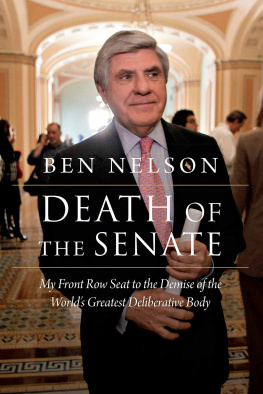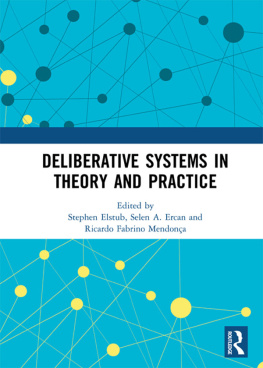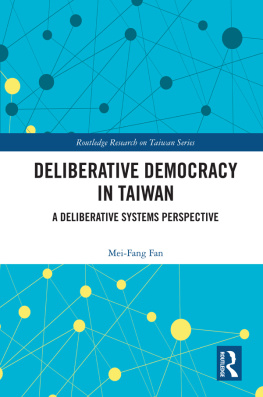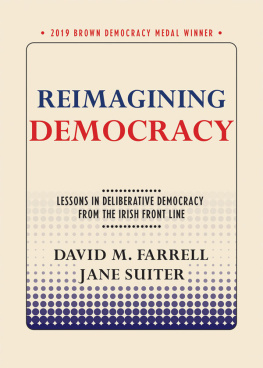Ben Nelson is a prankster but this book isnt intended to be one of his jokes. Hes dead right. The Senate as a widely admired deliberative body is in danger of becoming a smaller version of the fractious, divided House. With humor, behind-the-scenes drama, and thoughtful insights about the Senates decline, Nelson also includes perceptive comments from a number of our colleagues to offer a way forward so we all can save the Senate!
Claire McCaskill, former U.S. senator (Missouri)
Ben Nelsons book has never been more timely or necessary. With sharp insight, honesty, and wit he takes readers inside the United States Senate to reveal how this bulwark of our democracy worked well not so long ago. Nelson traces its fall into partisan division and rancor and outlines how we all can restore the Senate through bipartisanship, courtesy, and a willingness to see past each others differences, for the benefit of all Americans.
Harry Reid, former U.S. Senate Democratic leader (Nevada)
Sen. Ben Nelson was a workmanlike senator; serious, bipartisan, curious, and capable. This book is a reflection of his work on big issues that seem distant but inform our present: the Bush tax cuts, 9/11 and wars in Afghanistan and Iraq, TARP , the Affordable Care Act, and early Senate feuds over judicial appointmentsincluding the one over Brett Kavanaugh. Nelson explains how legislation moves; how relationships are built and how they sometimes shift; how the gears of government grind or meshdepending on the way they are used or misused.... You can hear a straightforward plea for a Senate in which senators can without sanction move between both parties and forge compromise; a place where movement is valued over stasis; a place where ideology doesnt ceaselessly triumph over practicality.
Major Garrett, chief Washington correspondent for CBS News
Ben Nelson paints a clear picture of the way things in American politics ought to be, but this book equally reveals what the political reality is today. Nelson then mixes in messages of hope to remind us about what politics can be, but he leaves it to us to determine what American politics will be in the future.
Mark Pryor, former U.S. senator (Arkansas)
Senator Ben Nelson offers compelling insights about his time as a conscientious public servant as he covers historical events and issues such as 9/11, the Affordable Care Act, Supreme Court appointments, dealings with U.S. presidents, and more. Politics was his way of life and the book reads as a folksy narrative by a senator in the know. Democratic U.S. senators from Nebraska have been rare. It is noteworthy throughout the book how Senator Nelson could navigate through the Republican voters and prevail as a governor and a senator. I am not sure when another Ben Nelson Democrat will emerge.
Peter J. Longo, author of Great Plains Politics
Death of the Senate
My Front Row Seat to the Demise of the Worlds Greatest Deliberative Body
Ben Nelson
Foreword by Trent Lott and Joseph Lieberman
Potomac Books
An imprint of the University of Nebraska Press
2021 by Ben Nelson
Cover designed by University of Nebraska Press; cover image: AP Photo/J. Scott Applewhite.
All rights reserved. Potomac Books is an imprint of the University of Nebraska Press.
Library of Congress Control Number: 2021933234
The publisher does not have any control over and does not assume any responsibility for author or third-party websites or their content.
To my daughter Sarah Jane (19702016), a precious gift taken too soon, who inspired and encouraged me to write this book;
To my wife, Diane, and kids Kevin, Christie, and Patrick, who always supported me in our political journeys;
To my parents, Ben and Birdella, who taught me to believe that all things are possible and if you want them enough to go after themthey were right;
To the Nebraskans who supported my goal of One Nebraska and made it possible to make Nebraska stronger together.
Contents
When the Lions Roared
Trent Lott & Joseph Lieberman
By todays standard operating procedure, youd expect sending a Southern conservative Republican and a Northeastern liberal Democrat to the United States Senate would result in battles on the Senate floor involving recriminations, suspicions and political gamesmanship. But thats not what happened after voters elected the two of us in 1988 and we entered the Senate.
The son of a shipyard worker and son of a liquor store owner took the oath of office, as all senators do, to defend the Constitution from all enemies foreign and domestic. We did not bring boxing gloves, we werent looking for a fight. We didnt come to Washington and the Senate to make a statement. We came to make a difference. We wanted to tackle problems bedeviling our constituents and country, from taxation to education to job-creation, to lift up the lives of everyday working Americans, and to right some wrongs in our ever-evolving democracy. We aimed to do soand actually didby working to build consensus, collaboration and coalitions. We sought support for legislation from colleagues on both sides of the aisle, for with numbers comes power to enact meaningful, durable and bipartisan change. Most of what we achieved that we feel good aboutthen and nowwas bipartisan.
But the Senate doesnt operate that way today. It is a dysfunctional and divided place utterly lacking in the joy and sense of shared purpose we knew. Thats why this book by our colleague Ben Nelson matters so deeply. He tells a story worth reading, blending detail, facts, and humor in a sharp and accurate reflection on a special time that wasand could be again if the right circumstances and will emerge in the Senate and country. Hes not out to settle scores or to fan the flames of division rampant in Congress and our country, although that would be the easier path, would potentially play well in the far-left and far-right media, and it would fit in the current genre of political tomes that attack anyone perceived as the others from the first to the last page.
No, Nelsons got a subtler message. Its rooted in a story his communications director, David Di Martino, shared. After Nelson had been in the Senate for a year or two and had played high profile roles on tax cuts and war and peace issues, he told Di Martino that hed noticed a slump in his press coverage. He teasingly attributed this to Di Martinos failings as a media master, and asked how this could be fixed. No problem, Senator, said Di Martino, a bit tongue in cheek, All you have to do is go out there every day and blast President George W. Bush. Your coverage will go through the roof. Nelson responded, I cant do that! Both knew that wasnt Nelsons way. He, like us, came to Washington to work with Bush whenever possible, to work with senators on both sides of the aisle in the same vein and to work for constituents who expected results not empty rhetoric.
In this book, Nelson takes us back to a time when the Senate functioned reasonably well, mainly in the 2000s, andthrough a series of storiesshows how and why the Senate was able to achieve success on major issues from war to economic stimulus, judicial fights to health care and more. Youll go behind the scenes with key players, formidable people like John McCain and Ted Kennedy and Barbara Boxer and Susan Collins, and see how relationships mixed with real trust and respect were underpinnings that brought senators together to pass bipartisan legislation benefitting the American people. Nelson, finally, lays out recommendations that could restore the Senate to a smoother-running, more congenial and effective body where the word comity again rules.










